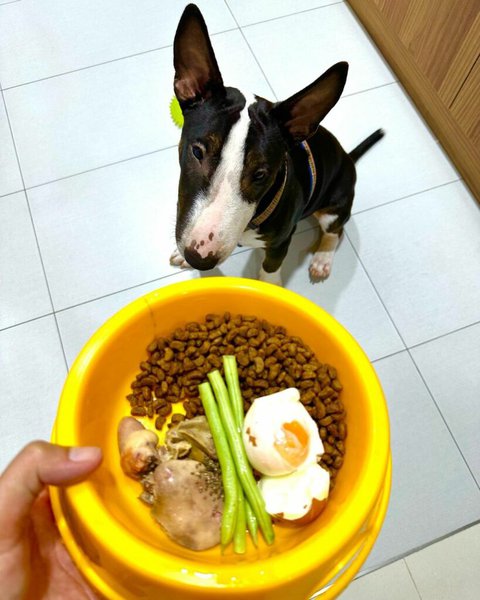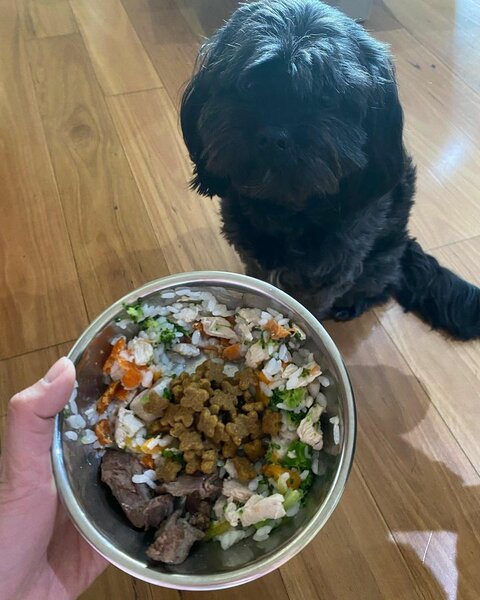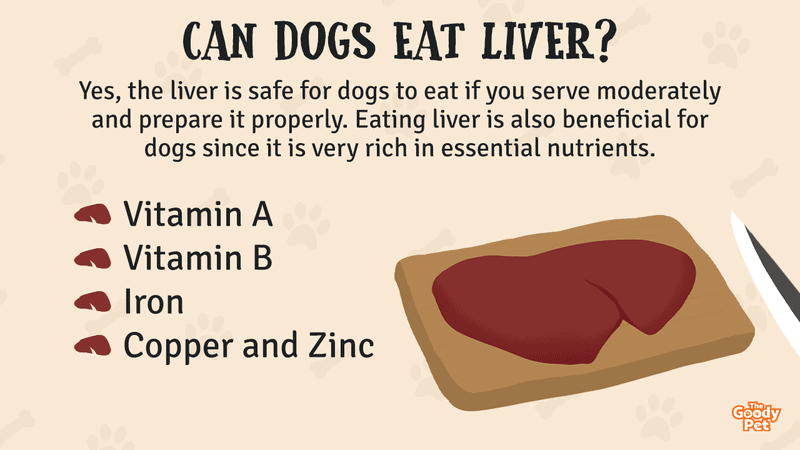Dogs love to eat meat and wouldn’t often discriminate between which parts you feed them. As a dog lover, you could worry about letting dogs have offals of the animals we eat, such as sheep, chickens, and cows. Among these organs, the liver is a favorite for many. Talking about the liver, is it appropriate for dogs? And can dogs eat liver?
Yes, dogs can eat liver since it is densely packed with most of the essential nutrients your dog needs to stay healthy. Among them are vitamin B12, vitamin A, riboflavin, and copper. Also, there are numerous advantages to feeding your dog liver, of which clear eyesight is one.
However, there are several questions we must answer if you would safely give your canine friend liver. First, we must establish how safe this meat is for your dog. Also, what are the possible side effects of serving your canine friend liver? We will answer all of these questions and many more in this article.
Is Liver Safe For Dogs?

Yes, the liver is safe for dogs to eat if you serve moderately and prepare it properly. Eating liver is also beneficial for dogs since it is very rich in essential nutrients.
- Vitamin A: Also known as retinol, the antioxidant enhances your dog’s vision and helps its organs, such as the heart, kidney, and reproductive organs, function optimally.
- Vitamin B: Both vitamins B2 (riboflavin) and B9 (folate) help the growth and function of body cells, and they can help to prevent fatigue and anemia.
- Iron: This mineral helps to transport oxygen to the blood cells, controls body temperature, and enhances brain function. Increasing iron intake can improve a dog’s strength and endurance.
- Copper and Zinc: They are vital minerals that support healthy bones and joints.
However, take care not to give your Fido too much liver to prevent an excessive nutrient intake.
How Much Liver Can I Give My Dog?
Small dogs can consume 0.2 oz of liver meat, while larger canines can have at most one ounce of liver meat.
Since liver meat is very dense in nutrients, eating an excess of it can cause a nutrient overdose for your four-legged friend. For example, 100g of beef liver contains many times the recommended dietary intake (RDI) of vitamin A for dogs. That means dogs may suffer vitamin A poisoning by eating too much liver. Overall, you should give your dog no more than 5% of your dog’s daily diet.
How Often Can Dogs Eat Liver?
Dogs may eat liver occasionally or every day, depending on the quantity of liver you let them have.
Since the liver has a high nutrient concentration, it is crucial that you do not give your canine friend this food often to prevent the excess presence of these nutrients in their body. And if you prefer to do so daily, know the appropriate quantity to give your dog daily that won’t be excessive.
Is Liver Good For Dogs Every Day?
No, liver is not good for dogs every day. Since the nutrient content in each piece of liver is rather abundant, it can become excessive for your dogs to feed on it daily.
Meanwhile, if you wish to make liver a daily treat for your dog, the amount must be less than one ounce (28g) daily. Dogs need only about a quarter of vitamin A available in 100g of beef liver.
Keeping the quantity that small ensures your dog doesn’t overdose on the nutrients which put their health at risk.
Should I Give My Dog Raw Or Cooked Liver?

Cooked liver is better and safer for dogs, so you should avoid feeding your furry friend raw liver.
Although cooking may cause the loss of some liver nutrients, the process decontaminates the meat. Several parasites may reside in the liver, which could infect your furry friend, causing untold health problems. Moreover, if your dog has not been eating raw meat before, eating raw liver can cause stomach upsets, vomiting, and stooling.
Can Dogs Eat Raw Liver And Kidneys?
No, dogs should not eat raw liver and kidneys because doing so may expose your dog to bacteria infestation.
Both liver and kidney are highly nutritious for dogs but also potential carriers of bacteria and viruses, such as E. coli, Salmonella, and Campylobacter. These could cause food poisoning and, ultimately, death to your canine friend.
Although it isn’t every liver that contains this endoparasite, there is no way to tell which one is free from these contaminants. Freshness is not an indicator of a liver free of these contaminants. Cook these offals in moderate heat for sufficient time to destroy these parasites and make them safe for your dog’s consumption.
Is Cooked Liver Any Good For Dogs?
Yes, the cooked liver is perfect for dogs because you’re sure there is no chance of food poisoning when they feed on them.
Besides, the cooked liver is more tender for dogs to eat and less likely to cause stomach upsets or other problems.
Can I Fry Liver For My Dog?
No, you cannot fry liver for your dog since frying increases its lipid content making it unhealthy for your dog’s consumption.
The liver is naturally low in fat, but frying it would cause an increase which is bad for dogs. When dogs eat fried liver, they increase the risk of getting pancreatitis. Besides, the excess lipids in the diet can cause your dog stomach upset, stooling, and even fever.
How Do You Prepare Liver For Dog Food?
When preparing liver for your dog food, do not add additional ingredients, such as spices, oils, and butter. The plain-cooked liver is best for your canine friend. Here is how to do it.
- Cut the liver into pieces, considering how small you want it to be for your dog meal, knowing it shrinks while cooking.
- Pour the liver pieces into boiling water and let it simmer for a quarter of an hour or when it gets tender.
- Alternatively, you can bake it by placing it on a baking sheet and cooking it in the oven at 375 °F for about thirty minutes.
You should ensure the liver is well-cooked to zero the chances of any bacteria contaminant surviving the process.
What Type Of Liver Is Best For Dogs?
Beef liver is best for dogs among the healthy options because it is safer and more nutritious.
An alternative is chicken liver, but by comparison, beef liver is lower in calories and fat and higher in vitamins B2, B12, and A. Again, beef liver has about 20 times the copper content in chicken liver. Copper is not produced naturally in your furry friend’s body but is essential for supporting your brain, heart, and skin functions.
Can You Feed Dogs Beef Liver?
Yes, you can feed dogs beef liver, and it is the healthiest among the lot.
Beef liver is okay for your dogs, and makes an excellent source of proteins, healthy fat, vitamins, and minerals. Gram for gram, beef liver contains more nutrients than chicken and pork liver.
Can Dogs Eat Liver Mush?

Yes, dogs can eat liver mush, but only as an occasional treat.
Livermush is basically a loaf of pork liver and meat scraps bound with cornmeal. The main ingredients are not toxic to your canine friend, but you should be aware that it often contains pepper and sage spice.
While sage is not a concern to Fido’s health, pepper should be because it can cause nasal irritation and digestive issues. But a little liver mush as an occasional treat should be fine.
Can Dogs Eat Pork Liver?
Yes, dogs can eat pork liver but only occasionally and in small servings.
Although pork liver is less fatty than chicken and beef liver, it does not measure up with others in terms of nutrient content. So, while your dog can eat pork liver, keep the portions small and never attempt feeding your dog raw pork liver due to the risk of trichinosis.
Can Dogs Eat Chicken Liver?
Yes, dogs can eat chicken liver since it is a healthy source of high-quality protein and amino acids.
Chicken liver is often among the ingredients in many commercial dog food due to its high vitamin and mineral content. Like others, you should not give raw chicken liver to your dog because it could be carrying Salmonella.
Why Should Dogs Not Eat Liver?
Dogs should not eat liver in high quantities because it may cause a nutritional problem known as hypervitaminosis A.
Hypervitaminosis A is very probable when dogs eat liver because this organ contains a high vitamin A concentration.
According to nutrition data, 100g of beef liver contains 17,997 IU of vitamin A. Meanwhile, the recommendation for dogs is 5,000 IU/kg DM. That is about four times what your dog needs.
Signs of vitamin A overdose include vomiting, drowsiness, irritability, and skin peeling. Untreated, this condition can lead to bone deformities, weakened muscles, digestive trouble, and weight loss.
Besides, dogs may ingest too much copper from consuming liver. The only way to avoid this situation is to mind the quantity you feed them every time.
Does Liver Give Dogs Diarrhea?

Liver may give dogs diarrhea if they eat too much of it, leading to an overdose of some nutrients like iron and vitamin A.
Part of the symptoms of nutrient overdose in dogs is diarrhea. Dogs may also have diarrhea from eating liver if you serve them uncooked ones. Other than these two conditions, liver is just fine for dogs and will not cause digestive problems.





